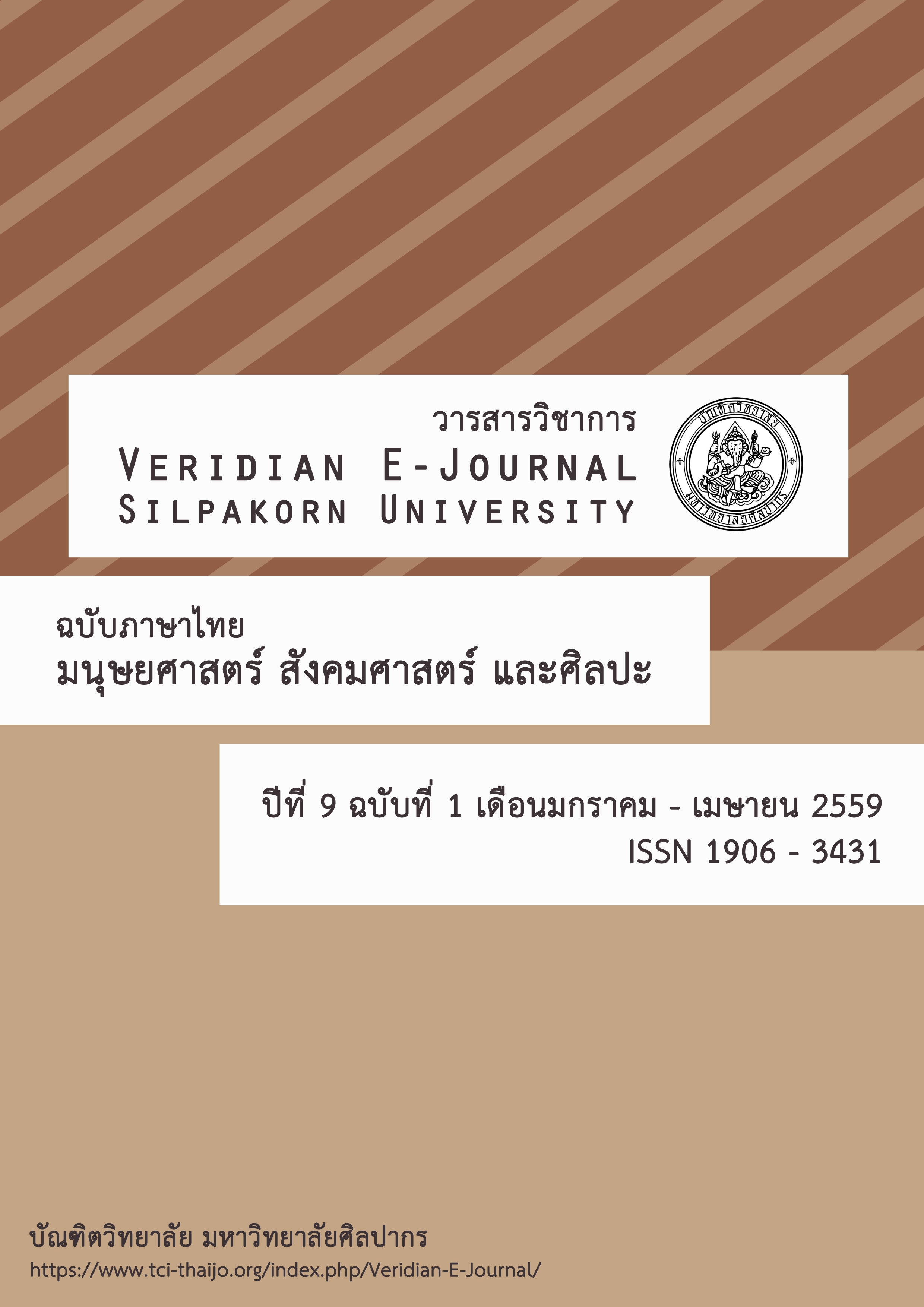การพัฒนาความเป็นผู้ประกอบการวิสาหกิจขนาดกลางและขนาดย่อมของผู้ประกอบการกิจการผู้ผลิตและจัดจำหน่ายเกษตรอินทรีย์ภายใต้สัญลักษณ์ผลิตภัณฑ์อินทรีย์ที่ได้มาตรฐานของประเทศไทย
Main Article Content
Abstract
บทคัดย่อ
วัตถุประสงค์ของการศึกษาเพื่อศึกษาความเป็นผู้ประกอบการตามแนวคิดทฤษฎีพฤติกรรมที่ใช้โอกาสเป็นพื้นฐานในการดำเนินงานขององค์กร(Opportunity-based Firm Behavior) และศึกษาปัจจัยที่ส่งผลต่อความเป็นผู้ประกอบการ และเสนอวิธีการพัฒนาความเป็นผู้ประกอบการของผู้ผลิตและจัดจำหน่ายเกษตรอินทรีย์ภายใต้สัญลักษณ์ผลิตภัณฑ์อินทรีย์ที่ได้มาตรฐานของประเทศไทย กลุ่มตัวอย่างที่ใช้ในการวิจัยจำนวน 108 ราย (ตารางจำนวนประชากร และจำนวนกลุ่มตัวอย่างของ Krejcie and Morgan) เก็บข้อมูลจำแนกตามภูมิภาค คือ ภาคกลาง ภาคตะวันตก และภาคตะวันออก แบบสอบถามเป็นเครื่องมือที่ใช้ในการเก็บรวบรวมข้อมูล มีความเชื่อมั่นและความถูกต้องอยู่ในระดับสูง คือ .86 การวิเคราะห์ข้อมูลด้วยสถิติเชิงพรรณนาได้แก่ จำนวน ร้อยละ ค่าเฉลี่ย และ ส่วนเบี่ยงเบนมาตรฐาน สถิติอ้างอิง คือ การทดสอบสมมติฐานด้วย t-test การวิเคราะห์ความแปรปรวนทางเดียว (One-way ANOVA) และวิเคราะห์ความแตกต่างรายคู่ โดยวิธีLSD และการวิเคราะห์สัมประสิทธิ์สหสัมพันธ์แบบเพียร์สัน ที่ระดับนัยสำคัญทางสถิติ .05
ผลการศึกษาพบว่า ผู้ตอบแบบสอบถามส่วนใหญ่มีความเป็นผู้ประกอบการตามพฤติกรรมที่ใช้โอกาสเป็นพื้นฐานในการดำเนินงานขององค์กร ภาพรวมอยู่ในระดับมาก นอกจากนี้จากพฤติกรรมของความเป็นผู้ประกอบการทั้ง 6 ด้าน พบว่ามุมมองเชิงกลยุทธ์ เป็นด้านที่ผู้ประกอบการมีความเป็นผู้ประกอบการมากที่สุด และด้านปรัชญาการให้รางวัล เป็นด้านที่มีความเป็นผู้ประกอบการ น้อยที่สุดมีค่าเฉลี่ยอยู่ในระดับปานกลาง
ผลการทดสอบสมมติฐาน พบว่าความเป็นผู้ประกอบการตามพฤติกรรมที่ใช้โอกาสเป็นพื้นฐานในการดำเนินงานขององค์กรพบว่า แตกต่างกันตาม อายุ และความรู้เฉพาะทางธุรกิจ ประเภทกิจการ ลักษณะการดำเนินกิจการ ระยะเวลาในการดำเนินกิจการ เงินลงทุนเมื่อเริ่มกิจการ ประเภทลูกค้า พื้นที่ทำการผลิตการถ่ายทอดเทคนิคการตลาด และการจัดจำหน่ายให้กับผู้ประกอบการรายอื่นมีการอภิปราย และข้อเสนอแนะที่ได้จากการวิจัย คือ 1) ผู้ประกอบการควรมีการให้รางวัลพนักงานและแรงงานทั้งด้านตัวเงิน และไม่ใช่ตัวเงิน 2) รัฐบาล หรือหน่วยงานที่เกี่ยวข้อง ควรมีการทำโมเดลศูนย์รวมการทำเกษตรอินทรีย์ครบวงจรในแต่ละชุมชนหรือ จังหวัด / ส่งเสริมการรวมกลุ่มผู้ประกอบการเกษตรอินทรีย์ โดยการรวมกลุ่มผลิตภัณฑ์ เดียวกัน และการรวมกลุ่มข้ามผลิตภัณฑ์ เพื่อเพิ่มจุดเด่นและสร้างมูลค่าเพิ่มให้กับผลิตภัณฑ์ทางการเกษตร /ควรส่งเสริมการขอมาตรฐานเกษตรอินทรีย์สากล และ มีการเพิ่มตรารับรอง หรือการประกวด ให้แก่ สินค้าเกษตรอินทรีย์ที่มีความโดดเด่น เป็นนวัตกรรมใหม่ ๆ ให้กับผู้ประกอบการเกษตรอินทรีย์ไทย/รวมไปถึงจัดตั้งศูนย์การกระจายสินค้าเกษตรอินทรีย์ เป็นต้น
คำสำคัญ : ความเป็นผู้ประกอบการ/ วิสาหกิจขนาดกลางและขนาดย่อม/ ผลิตภัณฑ์เกษตรอินทรีย์
Abstract
The aim of this research is to study owner’s behavior based on the theory of Opportunity-based Firm Behavior, and to identify the factors affecting the development of entrepreneurship of organic agricultural producers and distributors under the standard organic Thailand’s brand. 108 samples were randomly collected in various regions in Thailand. Data were collected by questionnaires and results yielded a high level of reliability of .86 and validity. The analytic tools of descriptive statistics, such as percentage, arithmetic mean and standard deviation were employed. For inferential statistics, hypotheses were tested using the t-test ,the F-test (one-way ANOVA). By using the method of LSD to compare the match and examine the relationship by using Pearson Product Moment Correlation Coefficient at the .05 significance level.
The findings revealed that most of the respondents’ overall entrepreneurship was rated at the ‘high’ opportunity-based Firm Behavior level. Among six aspects of an entrepreneurship behavior, it was found that Strategic Orientation was rated the highest and Reward Philosophy having the lowest score, was rated as average ‘medium’ level.
The hypothesis testing results showed that there were differences in their overall opportunity-based Firm behavior entrepreneurship in terms of age and innovative-based knowledge on business, types of characteristics of business operations, periods of business operations, levels of start-up capital, customer types, product types, marketing techniques and distribution channels to other organic product entrepreneurs. Many recommendations and discussions from a number of research state that 1) companies should provide their own employee incentive programmer to reward employees who achieve company goals. The incentive could be financial incentive or holiday incentive etc. 2) Government and other relevant organizations should have a center for organic agriculture industry by linking communities and provinces together. The mentioned organizations can support organic agriculture traders and also add value to products by combining multiple similar or same products. Additionally they are able to support an application for the ownership of international organic certificate and arrange product contests for new and innovative organic agriculture products as well as setting up products distribution centers.
Key Words: Entrepreneurship/ Small and Medium Enterprises/ Organic Agricultural Products
